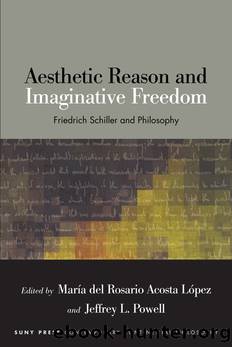Aesthetic Reason and Imaginative Freedom by unknow

Author:unknow
Language: eng
Format: epub
ISBN: 9781438472218
Publisher: SUNY Press
Published: 2018-07-15T05:00:00+00:00
Nature Superseding Itself through Art: The Moral Longing of Sentimental Poetry
The foregoing accounts of the species of naïveté, together with the naïveté characteristic of genius, fill out the picture of the distinctive conception of nature supposed and portrayed by naïve poetry. The nature that we find in naïve phenomena is morally pleasing because it represents possibilities of honest self-expression not beholden to convention, making our nature clear to ourselves and others. Yet it does so paradoxically, as noted above, given its dependence upon a conception of a dissembling, cultural conventionality.
As Schiller segues into his discussion of sentimental poetry, he makes this conception of naïve nature explicit by elaborating two sorts of longing for nature. He challenges his readers to consider what they long for when, fed up with social affectedness and cultural conventions, they pine for nature. The nostalgia that we feel when, for example, we experience a childâs naïveté can make us long for the happiness or perfection of nature. The former sort of longing is motivated by sensory desires, the latter only by moral aspirations. While it is clear that Schiller associates nature in naïve poetry with the longing motivated by moral aspirations, he also makes clear the necessity of refusing to identify with it. Indeed, it is necessary to forgo the happiness that comes from nature alone in order to pursue its perfection or the lost completeness of it. As Schiller puts it, while only a sensual individual complains about the loss of purely natural happiness, âonly a moral individual can mourn the loss of natureâs completeness.â Indeed, together with that loss, submitting to all the evils of culture is, he states âthe natural condition of all that is good.â17 Hence, he concludes with the conditional admonition, âif you can take consolation in the loss of natural happiness, then let its completeness serve as the model of your heartâ (NSD 192f/428).
When Schiller turns to sentimental poetry, the two different sorts of longing for nature, i.e., for natural happiness and for natural completeness, give rise to different senses of ânature,â i.e., a crude, unrefined nature and a refined, but pure nature. While the latter alone is the theme of both naïve and sentimental poetry, it can only be expressed sentimentally, that is ideally once culture and art have laid their hands on the human being (NSD 200f/436f). Since Schiller countenances naïve poetry in modernity, he presumably means that it can be expressed only in times when we are in the grip of culture and art. In such circumstances, our unnaturalness is the catalyst for our urge for simplicity, for finding outside us in nature what is no longer in us. Hence the moral nostalgia we feel for our lost childhood. Sometimes Schiller speaks of culture, the culprit in this regard, without qualification; other times he is referring to modern culture, such as when he contrasts his contemporaries with the Greeks. What comes naturally for the Greeks, we have to objectify and transform into an idea. Thus, Schiller observes, âthey felt naturally, while we feel the natural.
Download
This site does not store any files on its server. We only index and link to content provided by other sites. Please contact the content providers to delete copyright contents if any and email us, we'll remove relevant links or contents immediately.
What's Done in Darkness by Kayla Perrin(25493)
Shot Through the Heart: DI Grace Fisher 2 by Isabelle Grey(18209)
Shot Through the Heart by Mercy Celeste(18153)
The Fifty Shades Trilogy & Grey by E L James(17768)
The 3rd Cycle of the Betrayed Series Collection: Extremely Controversial Historical Thrillers (Betrayed Series Boxed set) by McCray Carolyn(13182)
The Subtle Art of Not Giving a F*ck by Mark Manson(12898)
Scorched Earth by Nick Kyme(11823)
Stepbrother Stories 2 - 21 Taboo Story Collection (Brother Sister Stepbrother Stepsister Taboo Pseudo Incest Family Virgin Creampie Pregnant Forced Pregnancy Breeding) by Roxi Harding(11019)
Drei Generationen auf dem Jakobsweg by Stein Pia(10211)
Suna by Ziefle Pia(10179)
Scythe by Neal Shusterman(9251)
International Relations from the Global South; Worlds of Difference; First Edition by Arlene B. Tickner & Karen Smith(8600)
Successful Proposal Strategies for Small Businesses: Using Knowledge Management ot Win Govenment, Private Sector, and International Contracts 3rd Edition by Robert Frey(8407)
This is Going to Hurt by Adam Kay(7682)
Dirty Filthy Fix: A Fixed Trilogy Novella by Laurelin Paige(6445)
He Loves Me...KNOT by RC Boldt(5798)
How to Make Love to a Negro Without Getting Tired by Dany LaFerrière(5369)
Interdimensional Brothel by F4U(5299)
Thankful For Her by Alexa Riley(5149)
